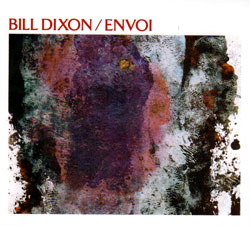
In a recent article on the late great trumpeter Bill Dixon (1925-2010), the newspaper's purported photo of Dixon was actually a photo of multi-instrumentalist Giuseppi Logan. Jazz fans were understandably miffed by the blatant error; as Squid's Ear writer Kurt Gottschalk wryly noted on Facebook, "Giuseppi Logan looks about as much like Bill Dixon as a saxophone looks like a trumpet."
And yet, it's highly probable that Dixon would have been amused by the snafu. In jazz historian Ben Young's essential bio-discography Dixonia, Dixon states, "The way to get me away from something is have everybody dig it — then I'm off and running." Dixon was a man who always went his own way, often spending years ignoring the public eye and the music marketplace. This is one of the reasons why someone of his enormous talent and intelligence is not better known, despite his major contributions to jazz history, which include his role as organizer and producer of the seminal October Revolution in Jazz in 1964, as well as founder of the equally seminal Jazz Composers Guild in 1965.
Releases by Dixon have always been cause for celebration, and that's particularly true now with Envoi. A recording of Dixon and a staggeringly talented band at the 2010 Victoriaville Festival in Quebec, this turned out to be Dixon's last concert and last recording — in fact, he died a few weeks after the festival. Envoi consists of two long sections performed by nine musicians, including Taylor Ho Bynum, Ken Filiano, and the luminous Warren Smith. Dixon provided the music and the direction, and although he didn't actually play at the concert, he provided a brief prerecorded solo at the beginning of Section II entitled "Shrike." The solo is a powerhouse: Dixon shreds sound, and then shreds those shreds in an absolute burning fury.
Overall Envoi is a stunningly beautiful work that the listener will return to again and again. The work has the grandeur and mystery of the Miles Davis-Gil Evans' masterpiece Sketches of Spain, but unlike that work, where a perfectly aligned orchestra provides a steady foil for Davis, the horns here have no security whatsoever. Foreground and background shift constantly as the brass drops back and the rhythm section moves forward, and beautiful melodic lines often end abruptly or dissolve into distortion. Dixon has created a field of sound where just about anything can emerge, and as each section unfolds the listener is entranced by the harmonic interweaving, and enfolded into the music's profound emotional depths.
The word "envoi" means a brief stanza that concludes certain forms of poetry, and one can certainly look at this concert as a work that concludes a long and important career. The CD itself also has an envoi: at the end of the concert the audience breaks into enthusiastic applause, and then Dixon makes the following statement: "It is not so easy to attempt doing what you want to do in front of people who know what they would like for you to do. So, one does one's best, always, and one hopes for the best, always. Thank you."
Envoi is an indispensable release. Period.
Comments and Feedback:
|



